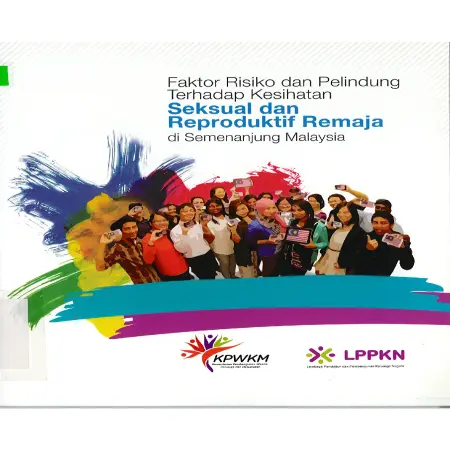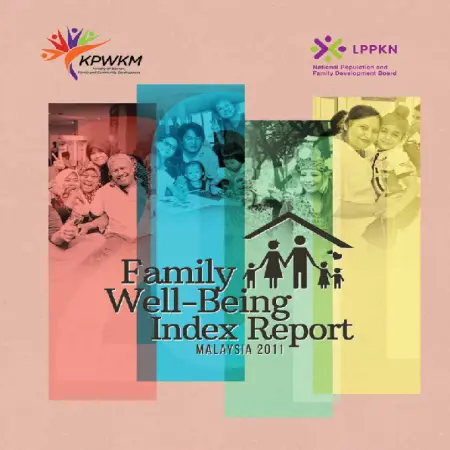Browse by Type
Results for Item type : "Research Report"
|
|
Faktor risiko dan pelindung terhadap kesihatan seksual dan reproduktif remaja di Semenanjung Malaysia
Item Type: Research Report
Editor:
Year: 00/00/2015
Abstract: In Malaysia, statistics from the National Registration Department (NRD) show that a total of 214,033 illegitimate children were born from 2004 to 2009. While statistics from the Royal Malaysia Police (RMP) show that 596 cases of baby abandonment were reported from 2005 to 2013. For the total number of rape crimes in among teenagers under the age of 18, PDRM statistics show an increase from 1,710 cases in 2006 to 2,658 cases in 2013. The increase in such cases shows that today's teenagers face the problem of moral decay and fragility of identity which is a concern of Malaysian society. Accordingly, knowledge of sexual and reproductive health can help adolescents avoid negative symptoms such as cases of extramarital pregnancies and social symptoms related to sexuality. The objective of this study was to (i). to study the prevalence of unhealthy sexual behavior among adolescents aged 13-24 years in peninsular Malaysia; (ii). identify risk factors related to adolescent sexual and reproductive health (ASRH); and (iii). identify protective factors related to ASRH. This study was implemented using two (2) main approaches, namely quantitative and qualitative methods. The design of the quantitative study was successfully conducted on 5,088 adolescents aged 13 to 24 years. The qualitative study involved a total of eight (8) Focus Group Discussions (FGD) conducted in eight (8) selected detention centers and shelter hostels located in several states in Peninsular Malaysia.
|
|
|
|
|
|
Family Well-Being Index Report Malaysia 2011
Item Type: Research Report
Editor:
Year: 00/00/2015
Abstract: In the past few decades, Malaysia has and is still undergoing a process of rapid social and economic development. This is a result of policies implemented by the government such as the New Development Policy (1991-2000), National Vision Policy (2001-2010) and Government Transformation Programme (2010-2020) which all aim to transform Malaysia into a developed and competitive country. However, the processes has imposed increased demands on the family institution because of the responsibilities and the challenges faced by the family
itself. The family institution must be strengthened to offset the rapid process of social and economic development. This is important because family is the basic social unit which prepares and supplies human capital resources for national development. Given the importance of family well-being to the future of the country, a scientific study needs to be conducted to measure the level of well-being of families in Malaysia. Measuring family well-being is crucial as it can indirectly measure the impact of the implementation of national social and economic development policies on families and the extent to which the implemented policies and programmes are successful or otherwise. Hence, this study has identified suitable indicators that can provide
information about the well-being of families in Malaysia. Subsequently,
based on the identified indicators, a Family Well-Being Index (FWI) was
developed to measure the current well-being of the family as well as
to be used in policy formulation, planning for implementation of future
research, the development of new programmes and services, and
expansion of the existing programmes.
|
|
|
|
|
|
Family and Health Survey in the Federal Territory and Petaling Jaya
Item Type: Research Report
Editor:
Year: 00/00/1977
Abstract: The main objectives of this study is to provide basic demographic data for the Federal Territory and Petaling Jaya, and to provide estimates of the family planning knowledge, attitude and practices and to identify measures to improve family planning services. The survey covered a total of 3,679 household in Federal Territory and Petaling Jaya.
|
|
|
|
|
|
Family planning acceptor survey
Item Type: Research Report
Editor:
Year: 00/00/1977
Abstract: The objective of this survey is to evaluate the on-going family planning programme and to identify factor that are helpful for the successful implementation of The National Programme in terms of better acceptance and continuity of contraception.This study covering a total of 3,750 family planning recipients who use the pill for years 1975,1976 and the first four months of 1977 and also some of those who make use of other modern methods. This study also involving 70 districts in peninsular Malaysia.
|
|
|
|
|
|
Family and health survey in the intensive input demonstration areas (IIDA II)
Item Type: Research Report
Editor:
Year: 00/00/1976
Abstract: The objective of this study is to subsequent evaluation to measure the impact of the integration of family planning and health services in rural areas. Some of the major findings in this survey are: 78% married below 20 years of age. The mean age at first marriage is 17 years old. One in five ever married women had two or more marriages.
|
|
|
|






